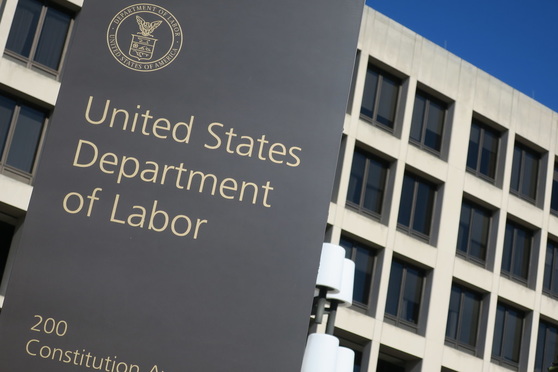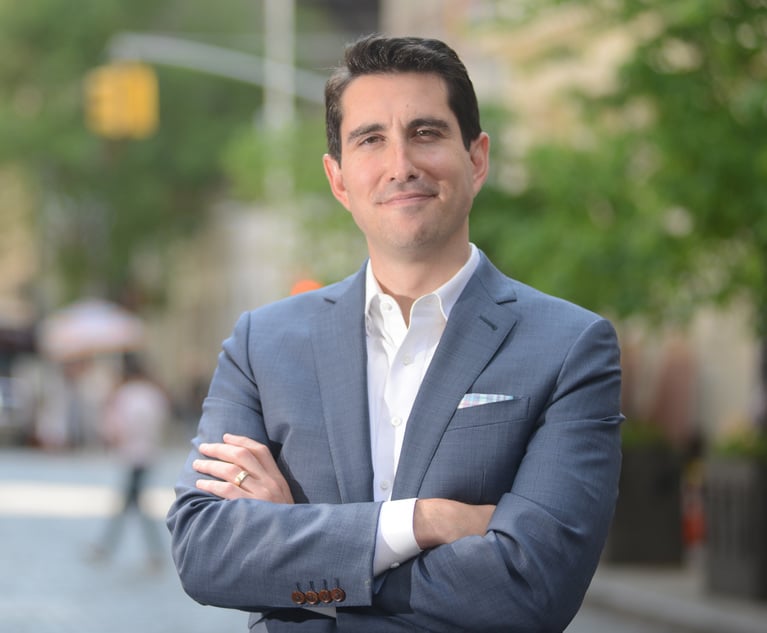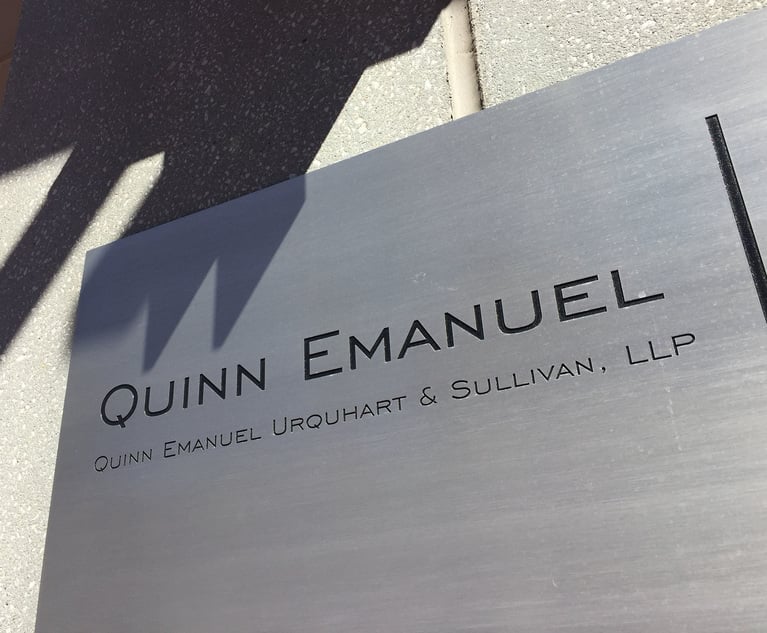US Labor Judge Balked at Breadth of a Wells Fargo Whistleblower Settlement
A U.S. Labor Department judge raised concerns about the breadth of a Wells Fargo whistleblower settlement, saying the release of claims was too broad. The lawyers have a second shot to amend the language. Wells Fargo has recently resolved several whistleblower cases.
March 13, 2018 at 12:12 PM
4 minute read
 U.S. Labor Department headquarters in Washington. Credit: Mike Scarcella
U.S. Labor Department headquarters in Washington. Credit: Mike Scarcella
A judge at the U.S. Labor Department this month refused to sign off on a settlement between Wells Fargo & Co. and a whistleblower, calling the scope of would-be protection for bank officials and affiliates too broad.
The administrative law judge, Steven Berlin, told the lawyers in the whistleblower retaliation case to more narrowly tailor the settlement language. Berlin said the proposed resolution “essentially releases certain persons and entities from all claims existing at any time” up to the settlement date.
“Approval of the parties' agreement requires that any release or waiver of claims be knowing and voluntary. I find that [Claudia Ponce de Leon] almost certainly has no idea whom she is releasing by signing this agreement,” Berlin, based in San Francisco, wrote in an order dated March 5.
Wells Fargo, represented by Gibson, Dunn & Crutcher, and the whistleblower, Claudia Ponce de Leon, tentatively reached a settlement in January. The bank had appealed an order last year that awarded Ponce de Leon $577,000 in back wages, damages and legal fees over her claims that the bank fired her for raising concerns about colleagues opening accounts without customers' knowledge.
Wells Fargo in recent months has moved to resolve at least several other whistleblower cases tied to the fake-accounts scandal. In 2016, the bank reached a $185 million settlement with federal regulators and the Los Angeles city attorney to resolve claims tied to the unauthorized account openings—a widespread practice that, the Consumer Financial Protection Bureau said, was driven by aggressive sales goals and a drive to receive bonuses.
Gibson Dunn partner Karl Nelson in Dallas, a lawyer for Wells Fargo, was not immediately reached for comment Tuesday.
Yosef Peretz, the San Francisco-based whistleblower lawyer who represented Ponce de Leon in the settlement, said that “although the comments of the judge are substantive, it's a procedural issue.”
“I expect the new agreement to be submitted soon, and I expect it to be confirmed,” Peretz said.
Berlin said Ponce de Leon's settlement released from claims “many thousands of employees” at Wells Fargo. “I am certain that even Wells Fargo has no idea how many people or entities are being released or who they are,” the judge wrote.
Berlin, in his order, said the settlement even would have released him from claims.
“An interesting example involves the administrative law judge personally,” Berlin wrote in the order, posted below. “[Ponce de Leon] most likely has no idea that she is releasing me personally—not just once, but twice—from all claims, known or unknown, arising out of events at any time from the beginning of time to the date of the parties' agreement.”
Berlin, a Labor Department administrative law judge for 10 years, said he represented Wells Fargo in the 1990s—a history, he wrote, that has “the effect of extending to me [Ponce de Leon's] release of all claims.”
Also, Berlin was an associate at Morrison & Foerster when the firm represented Crocker National Bank, which was acquired by Wells Fargo.
“Crocker is therefore a likely former affiliated company of Wells,” Berlin wrote. “[Ponce de Leon] thus is releasing me for a second and separate reason. I am certain that [Ponce de Leon] had no knowledge of this when she signed the settlement agreement.”
Berlin left Morrison & Foerster in 1980 to work at the U.S. Department of Justice. In 1984, he joined Littler Mendelson, where he was a partner until 2000, according to his LinkedIn profile.
In addition to Ponce de Leon's case, Berlin is presiding over the Labor Department's ongoing pay equity investigation of Google Inc.
Read more:
Meet the California Whistleblower Lawyer Helping Cities Sue Wells Fargo
Wells Fargo's Moves to Resolve Another 'Phantom Accounts' Whistleblower Case
Ending Appeal, Wells Fargo Settles Whistleblower's $577K Retaliation Case
This content has been archived. It is available through our partners, LexisNexis® and Bloomberg Law.
To view this content, please continue to their sites.
Not a Lexis Subscriber?
Subscribe Now
Not a Bloomberg Law Subscriber?
Subscribe Now
NOT FOR REPRINT
© 2025 ALM Global, LLC, All Rights Reserved. Request academic re-use from www.copyright.com. All other uses, submit a request to [email protected]. For more information visit Asset & Logo Licensing.
You Might Like
View All

Kraken’s Chief Legal Officer Exits, Eyes Role in Trump Administration
3 minute read
FTC Chair Lina Khan Sues John Deere Over 'Right to Repair,' Infuriates Successor
6 minute read
Quinn Emanuel Files Countersuit Against DOJ in Row Over Premerger Reporting
3 minute readTrending Stories
- 1Class Action Settlements Totaled $40B+ Three Years in a Row: 'We’re in a New Era'
- 2Automaker Pleads Guilty and Agrees to $1.6 Billion in Payouts
- 3MLB's Texas Rangers Search For a New GC and a Broadcasting Deal
- 4Does the Treasury Hack Underscore a Big Problem for the Private Sector?
- 5Gen AI Legal Tech Startup Eve Raises $47 Million Series A Investment
Who Got The Work
J. Brugh Lower of Gibbons has entered an appearance for industrial equipment supplier Devco Corporation in a pending trademark infringement lawsuit. The suit, accusing the defendant of selling knock-off Graco products, was filed Dec. 18 in New Jersey District Court by Rivkin Radler on behalf of Graco Inc. and Graco Minnesota. The case, assigned to U.S. District Judge Zahid N. Quraishi, is 3:24-cv-11294, Graco Inc. et al v. Devco Corporation.
Who Got The Work
Rebecca Maller-Stein and Kent A. Yalowitz of Arnold & Porter Kaye Scholer have entered their appearances for Hanaco Venture Capital and its executives, Lior Prosor and David Frankel, in a pending securities lawsuit. The action, filed on Dec. 24 in New York Southern District Court by Zell, Aron & Co. on behalf of Goldeneye Advisors, accuses the defendants of negligently and fraudulently managing the plaintiff's $1 million investment. The case, assigned to U.S. District Judge Vernon S. Broderick, is 1:24-cv-09918, Goldeneye Advisors, LLC v. Hanaco Venture Capital, Ltd. et al.
Who Got The Work
Attorneys from A&O Shearman has stepped in as defense counsel for Toronto-Dominion Bank and other defendants in a pending securities class action. The suit, filed Dec. 11 in New York Southern District Court by Bleichmar Fonti & Auld, accuses the defendants of concealing the bank's 'pervasive' deficiencies in regards to its compliance with the Bank Secrecy Act and the quality of its anti-money laundering controls. The case, assigned to U.S. District Judge Arun Subramanian, is 1:24-cv-09445, Gonzalez v. The Toronto-Dominion Bank et al.
Who Got The Work
Crown Castle International, a Pennsylvania company providing shared communications infrastructure, has turned to Luke D. Wolf of Gordon Rees Scully Mansukhani to fend off a pending breach-of-contract lawsuit. The court action, filed Nov. 25 in Michigan Eastern District Court by Hooper Hathaway PC on behalf of The Town Residences LLC, accuses Crown Castle of failing to transfer approximately $30,000 in utility payments from T-Mobile in breach of a roof-top lease and assignment agreement. The case, assigned to U.S. District Judge Susan K. Declercq, is 2:24-cv-13131, The Town Residences LLC v. T-Mobile US, Inc. et al.
Who Got The Work
Wilfred P. Coronato and Daniel M. Schwartz of McCarter & English have stepped in as defense counsel to Electrolux Home Products Inc. in a pending product liability lawsuit. The court action, filed Nov. 26 in New York Eastern District Court by Poulos Lopiccolo PC and Nagel Rice LLP on behalf of David Stern, alleges that the defendant's refrigerators’ drawers and shelving repeatedly break and fall apart within months after purchase. The case, assigned to U.S. District Judge Joan M. Azrack, is 2:24-cv-08204, Stern v. Electrolux Home Products, Inc.
Featured Firms
Law Offices of Gary Martin Hays & Associates, P.C.
(470) 294-1674
Law Offices of Mark E. Salomone
(857) 444-6468
Smith & Hassler
(713) 739-1250










